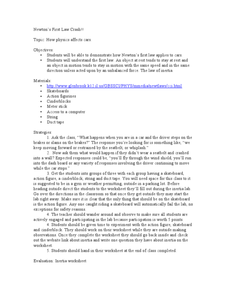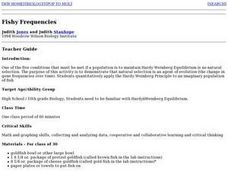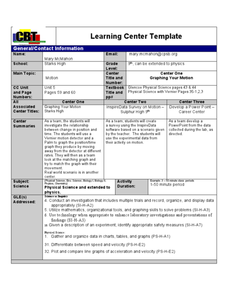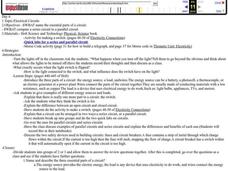Curated OER
Creating Coacervates
Young scholars create and observe coacervates. In this origin of life lesson, students create coacervates by mixing carbohydrate and protein solutions. They observe the life-like qualities of the structures and discuss the origin of life.
Curated OER
Newton's First Law Crash!!
Students examine Newton's first law of motion and demonstrate how it applies to cars. In this motion lesson students complete an experiment and worksheet on speed and inertia.
Curated OER
A Comparison of Polymeric Liquids with Newtonian Liquids
Students concretely illustrate and define a macromolecule, observe the unique behavior of polymers and relate to their knowledge of molecules, and use the scientific process to determine the difference between Newtonian and non-Newtonian...
Curated OER
Enzymatic Action
Students observe how a cell uses an enzyme to rid itself of a poisonous substance by experimenting with hydrogen peroxide, potatoes, liver and carrots. They record the temperature and changes of the hydrogen peroxide as other elements...
Curated OER
Measuring Calories in Food
Students measure the amount of calories in food. In this food energy instructional activity, students discuss what a calorie is, how our bodies use a calorie, and how many we need. Then, students use a calorimeter to calculate the amount...
Curated OER
Trapping CO2
Students investigate climate change and how the properties of carbon dioxide and methane play a part. In this climate lesson students use a chemical reaction to trap CO2 and methane.
Curated OER
Human Epidermal Cells
Students explore epidermal cells. After following specified procedures for removing epidermal cells from their wrist, students view the cells with the use of a microscope. After creating a drawing of their observation, students label the...
Curated OER
Experiment on Measuring Reaction Rates
Learners investigate the rate of a chemical reaction. In this rate of reactions lesson plan, students use an electronic balance to measure the change in mass of a chemical reaction between hydrochloric acid and calcium carbonate. They...
Curated OER
Microbiology Lesson
Students collect water samples and use a microscope to find bacteria in the samples. They categorize the different bacteria they find, determine the number of colonies there are, and predict how the bacteria levels might affect animals...
Curated OER
Fishy Frequencies
Tenth graders demonstrate that natural selection is an agent of evolution. They quantitatively apply the Hardy-Weinberg Principle to an imaginary population of fish. They utilize math and graphing skills, collecting and analyzing data,...
Curated OER
How Big is a Molecule?
Students calculate the size of a molecule. In this molecules and their sizes lesson plan, students find the size of an oleic acid molecule by using a measured amount of drops of oleic acid to find the volume of the sample, the thickness...
Curated OER
Huff, Puff, and Slide
For this experimental design worksheet, students use a cup and coins to determine the distance they can blow a cup with varying amounts of coins. They analyze their results and design an experiment using the same materials.
Curated OER
BJT Amplifier Troubleshooting
In this electrical circuit worksheet, students answer a series of 11 open-ended questions about BJT amplifiers and how to troubleshoot these circuits. This worksheet is printable and the answers are revealed online.
Curated OER
"Graphing Your Motion"
Students study the concepts of motion, velocity, and acceleration through graphing their own movement using LoggerPro. They explain the difference between speed and velocity using the weather vane example. They discover the difference...
Curated OER
Designing an Underwater Habitat for Humans
Students consider the limitations of deep water oceanography and design an underwater habitat to support scientists while they complete long term studies under the ocean. In this engineering lesson plan, students are introduced to the...
Curated OER
Electrical Circuits
Sixth graders make an electrical switch. In this electricity activity, 6th graders will make an electrical switch, a series circuit, and a parallel circuit. They explain an open and closed circuit and give examples of series and...
Curated OER
Dissolved Oxygen in an Aquatic Ecosystem
Students explain why dissolved oxygen is important in aquatic ecosystems. They evaluate the optimal dissolved oxygen levels for living organisms.
Curated OER
Volume of Gas
Eighth graders investigate the effect of temperature on the volume of a gas in a closed container. They measure the height of the water in their beaker/container, conduct their experiment, and create a graph to illustrate their data.
Curated OER
Change It
Fourth graders expand their knowledge about how the physical properties of a substances can be changed. They are given multiple opportunities, using first-hand experiences and familiar objects in different contexts, to identify...
Curated OER
Polymer
Students investigate polymers by completing 3 experiments. In this polymer lesson plan, students mix plastic with acetone, they create polyurethane foam, they make slime and build a polymer model once their polyurethane foam is set. ...
Curated OER
How Strong is the Solution
Learners investigate the strength of solutions. For this scientific inquiry lesson plan, students examine various solutions of food color and water as they discover the concentration of the solutions by adding bleach to clear the color.
Curated OER
Predicting the Growth of Microorganisms
Students determine where microorganisms might be found around their school. In this scientific investigation lesson, students collect cultures from various locations and place these in petri dishes. They incubate the cultures to see if...
Curated OER
Simulating the Greenhouse Effect in a Terrarium
Young scholars identify what factors effect global warming and how the greenhouse effect occurs. In this environmental lesson students view videos then complete an experiment using a terrarium to observe greenhouse gas.
Curated OER
Genetics the Easy Way
Students use recyclable trash to construct a Recycle Critter family. They calculate the probability of the phenotype of the offspring that two heterozygous parents produced.
Other popular searches
- Science Lab Safety Rules
- Physical Science Lab Safety
- Teaching Science Lab Safety
- Science Lab Safety Symbols
- Science Lab Safety Chart
- Science Lab Safety Contract
- Science Lab Safety Equipment
- Science Lab Safety Videos
- Science Lab Safety Activities
- Science Lab Safety Activites
- Safety in the Science Lab
- Science Lab Safety Song

























